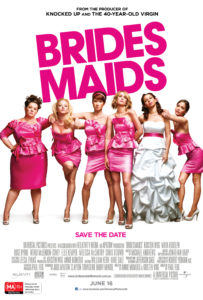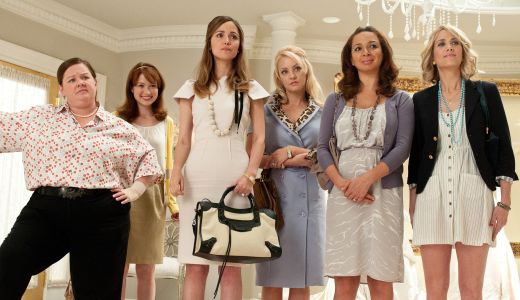 Burning up box offices around the world, Bridesmaids builds on the tradition of outrageous comedies that have formed the basis of director Paul Feig and Judd Apatow’s career. Apatow’s films have largely looked at the strong platonic bonds that form between men, in particular in Knocked Up and Funny People. Similarly, Feig’s comedy pedigree is unquestionable, having worked on seminal television series Arrested Development, the US version of The Office and Nurse Jackie. Yet this new wave of comedy, particularly Apatow’s, has been largely criticised for not only being male-centric, but in making unlikeable characters out of the women. Enter Bridesmaids.
Burning up box offices around the world, Bridesmaids builds on the tradition of outrageous comedies that have formed the basis of director Paul Feig and Judd Apatow’s career. Apatow’s films have largely looked at the strong platonic bonds that form between men, in particular in Knocked Up and Funny People. Similarly, Feig’s comedy pedigree is unquestionable, having worked on seminal television series Arrested Development, the US version of The Office and Nurse Jackie. Yet this new wave of comedy, particularly Apatow’s, has been largely criticised for not only being male-centric, but in making unlikeable characters out of the women. Enter Bridesmaids.
When the dysfunctional Annie (Kristen Wiig, Paul) is asked to be a bridesmaid for her best friend Lillian (Maya Rudolph, Grown Ups), it couldn’t come at a worse time. Following the collapse of her bakery during the recession, and an unsatisfying “sex buddy” relationship (with an uncredited Jon Hamm of TV’s Mad Men), Lillian must also compete for the bride’s attention with her new BFF, the wealthy and beautiful Helen (Rose Byrne, X-Men: First Class). With a tentative relationship growing between Annie and highway cop Rhodes (Chris O’Dowd, Gulliver’s Travels), will anybody make it to the church on time?
Bridesmaids may be a clear response to the male-centric comedies such as the The Hangover series, but this doesn’t diminish an iota of its own hilarity. While there are undoubtedly a number of “all men are jerks” moments, and the type of man-hating comedy that female comedians are all-too-often relegated to, Bridesmaids appears to speak more to what women really think about other women. Earlier Apatow comedies, in particular Knocked Up, have given very defined and borderline-unlikable portrayals of women. Even Apatow’s own wife, Leslie Mann, was given the role of the suspicious wife who’s goal for the majority of the earlier film was to crush the fun out of her husband’s life. It is perhaps no fluke then that the script this time was written by women for women. Wiig and Annie Mumolo, who cameos as a nervous flyer in the film, tap into something that might be observed but is rarely spoken about.
Essential to the success of a film like Bridesmaids is the casting, and here it is impeccable. The roles that women are given are clearly defined and played with in the film, as even the marketing campaign continues to milk this. There is the Innocent One (Ellie Kemper, Somewhere), who pities her unwed friends; Little Miss Perfect (Bryne); A Real Mother (Wendi McLendon-Cover, The Search for Santa Paws) and the real standout performance from the rotund Wild Card (Melissa McCarthy, Life As We Know It). Playing to and against type, these are just funny women doing incredibly funny things. In what will no doubt be one of the most remembered scenes from the film (outside of the infamous food poisoning sequence), a very intoxicated Annie lets her guard slip whilst talking to Helen, telegraphing the climax of the film. Bridesmaids doesn’t pull any punches on its way to the inevitable, and unlike the recent Hangover sequel, doesn’t dilute its formula for mass appeal. One of the strongest comedies in a long time.
[stextbox id=”grey” bgcolor=”F2F2F2″ mleft=”5″ mright=”5″ image=”null”]Although it’s inevitable, gender shouldn’t enter into the discussion with Bridesmaids, as this is one of the rare comedies that spans demographics and splits sides in equal measure.[/stextbox]
Bridesmaids was released in Australia on 16 June 2011 from Universal.





